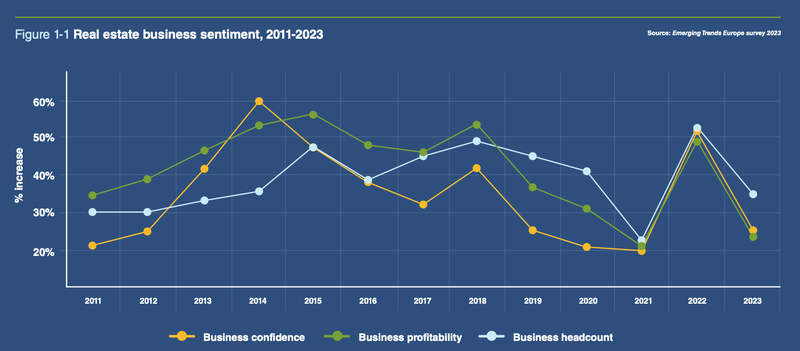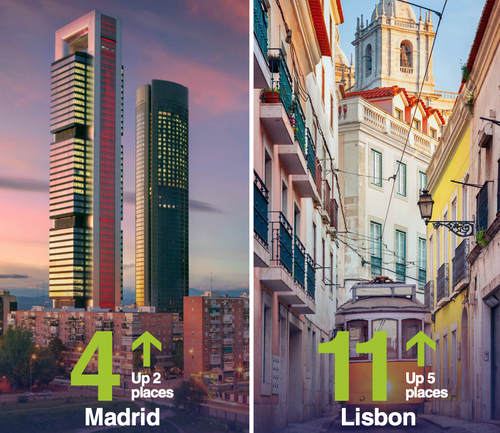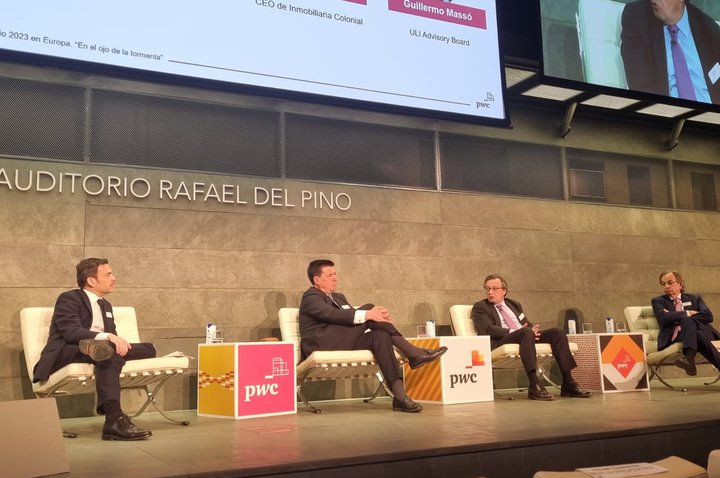The European Real Estate Market Trends 2023 report, a joint survey conducted by PwC and the Urban Land Institute (ULI), celebrated its 20th anniversary. The study, which was presented in Madrid last week, looks at the outlook for the European real estate sector in the short term and for 2023 as a whole. As European economies have begun to recover from the pandemic, they have been affected by the repercussions of the war in Ukraine. Beyond the immediate humanitarian impact, inflation, driven by higher energy prices, is altering the real estate outlook for the next twelve months.
Although real estate managers surveyed say that the Russian invasion of Ukraine has had little direct impact on their real estate portfolios, the consequences of this conflict are being felt in rising energy costs, well above average inflation and, more recently, higher interest rates.
Meanwhile, real estate business confidence and profitability expectations have fallen to record lows, reflecting widespread concern in the sector about a range of indicators in the business, political and real estate environment. The survey shows that 91% of respondents are concerned about inflation, followed closely by interest rate rises - 89% - and European economic growth - 88%. Political uncertainty at global, regional and national levels is a major concern, according to 79%, 68% and 54% of respondents respectively.

Growth opportunities and a good return on investment remain possible, but the equation of what constitutes success has changed
Although rental activity across Europe has remained reasonably stable in 2022, there is a widespread view that a recession could lead to a decline in occupancy and rents, even in those sectors that have hitherto shown strength. The real estate market is always evolving and 2023 will reward those who manage to renew their portfolios.
For Alberto Valls, president of ULI, "there is caution in the market, but it seems that the second half of the year could present important opportunities. According to the opinions of the study, we are not experiencing a crisis but a cyclical adjustment and therefore it is time for further transformation and management focused on improving assets".
Residential properties continue to be highly valued, as they are considered to have more income stability than commercial sectors. In addition, specialised sub-sectors, such as retirement homes for elderly populations, are attracting particular interest.
Undoubtedly, the main driver of change is the growing importance of ESG criteria. The real estate sector, from construction to management to financing, is integrating environmental, social and corporate governance aspects into its business decisions. This ranges from emissions reduction to diversity and inclusion within organisations. According to the survey findings, 87% of respondents consider it important to create social impact alongside financial profitability.
Madrid, the fourth most attractive European city for real estate investments
Madrid climbs two places and overtakes Frankfurt and Munich in the ranking of the most attractive cities to invest in bricks and mortar. Barcelona remains in ninth place on the list.
In this list, compiled by PwC and Urban Land Institute (ULI) based on 1,038 interviews with the main players in the sector, Barcelona maintains ninth place. Spanish cities are benefiting from the strong growth of wind and solar energy in the coming years, which will drive the real estate sector towards zero net emissions. In the case of Madrid, the city is also perceived as an investment-friendly destination with the potential to attract talent.
As for the neighbor country, Portugal almost made it to the top 10 in 2022 with Lisbon climbing up 5 places to the 11th position, thus reinforcing Iberia attractiveness.

In the medal table, London repeats as the most interesting city due to the attractiveness of its office and logistics markets and the good performance of the commercial and hotel segment following the reactivation of tourism. Paris moves up one position and overtakes Berlin, which comes in third. The French capital improves in perception, boosted by the hosting of the 2024 Olympic Games and its energy resilience in the face of the country's nuclear capacity.
Typical safe-haven destinations for investors in Germany, such as Frankfurt, Munich and Hamburg, fall in the rankings in anticipation of a higher inflation impact due to their dependence on Russian gas supplies.
In terms of asset type, new energy infrastructure tops the list of preferred sectors for the second year in a row. This is followed by facilities related to health sciences and data centres. In Spain, life sciences are not yet in sufficient demand from industry and data centres are still in the construction phase.
In contrast, mature assets such as offices and retail are among the least attractive. "Traditional sectors such as offices and shopping centres, which were the shining stars of the sky years ago, have faded into the background. There is also a two-speed evolution depending on their location and the degree of compliance with sustainability standards," says Antonio Sánchez Recio, partner in charge of the Real Estate, Construction and Services sector at PwC.
In the hotel sector, there is a significant gap between business and holiday hotels. "In Spain, which is a tourist power, leisure and holiday hotels play an important role," he adds.
The presentation event closed with a round-table discussion, where for its part, Ismael Clemente, CEO of Merlin Properties, defended that "although traditional assets are progressingly being diluted, investors are still keen to invest as they offer a higher liquidity to any portfolio".
On the other hand, Pere Viñolas, CEO of Colonial, commented that we are facing in some way a paradox, as "for the investment world there was a clear shock, but looking for the operating model things are going great! Rents haven't dropped, and neither as occupancy".

